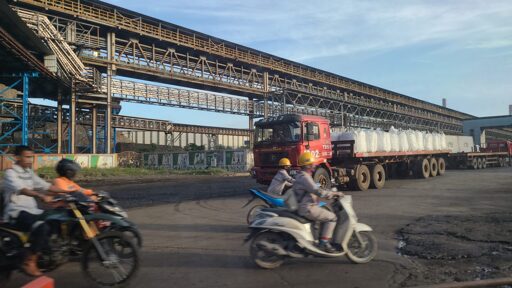cross-posted from: https://lemmy.sdf.org/post/44006161
[…]
Driven by economic and social pressures, tens of thousands of workers from China, mostly middle-aged men, are employed in eastern Indonesia’s nickel industry, which has sprung up in the last decade. Just as critical minerals crisscross the globe before they’re incorporated into cutting-edge products, so too do some of the people who make the world’s green dreams a reality.
[According] to more than a dozen of these Chinese workers and their family members, as well as Indonesian labor leaders who have negotiated factory conditions with top Chinese executives [it was found] that, even following fatal accidents at the smelters, efforts to improve working conditions have been slow, hindered by a lack of oversight from companies, governments, and international labor groups that were dependent on U.S. funding terminated by the Trump administration. We also obtained an internal company review of a nickel smelter expansion that shows facilities are likely spreading pollution and illness well beyond factory walls. Despite the challenges, new nickel processing plants continue to emerge in Indonesia and hire from China.
Before joining Indonesia’s nickel rush, most of these Chinese men had spent almost all their lives in their home country, working in declining steel factories. […] they had never before owned a passport or boarded a flight. Their leap into the nickel refining industry has helped create entire towns on remote islands in Indonesia, and it’s made them an unlikely backbone of the world’s green energy transition.
[…]
Nickel is a crucial component of EV batteries and energy storage systems. More nickel in an EV battery pack means longer mileage and improved performance from a single charge.
[…]
Indonesian workers, the Chinese companies that run the nickel factories, and international labor and environmental organizations have been attempting to improve working and living conditions. But the few changes that have taken place have come slowly. And such efforts have been hamstrung by the Trump administration’s new Department of Government Efficiency, or DOGE, which terminated almost all international grants from the U.S. Department of Labor. Those grants funded various initiatives to improve labor rights, occupational safety, and health, including in Indonesia.
[…]
“Tsingshan [Holding Group, a Chinese metal and stainless steel giant Tsingshan that was among the first companies to set up production in Indonesia in the early 2010s] started to snatch up economically strained factory workers nonstop in droves,” said Jiahui Zeng, an anthropologist studying eastern Indonesia’s nickel belt at Tsinghua University in China. “For Chinese nickel workers, migration is pushed by family pressure, such as buying an apartment in a better school district for their children or preparing for a son’s marriage.” But these pressures make Chinese workers extremely vulnerable.
“Terrified of losing their income, they are reluctant to organize and wary of speaking out in Indonesia,” she added.
[…]
[Chinese migrant worker] Wong recalled the instructor telling them there were more than 40 accidents in the industrial parks [in Indonesia] each year that resulted in severe injuries and even deaths. […] “I didn’t understand much at the time,” said Wong.
But before long, Wong had two close calls of his own. First, he burned the back of his right hand when metallic liquid from the furnace splashed at the exit of the waste tunnel as he was walking past. And one night after heavy rain, soon after he clocked out and left the furnace, Wong stepped on what he thought was a puddle, only to find out that it was a neck-deep pond. Not knowing how to swim, he was only able to save himself by grabbing a nearby pole and pulling himself out of the water.
[…]
Some workers he knew weren’t so lucky. An Indonesian colleague suffered severe injuries to his fingers after disregarding safety protocols to manually fix a glitch in the pouring chain. Another Chinese worker walked onto the top of an electric furnace in wet working boots and was instantly electrocuted into unconsciousness.
[…]
[A] review showed workers at the nickel-processing facilities, as well as residents nearby, were increasingly seeking care for respiratory diseases like tuberculosis, acute pharyngitis, and acute rhinitis. Despite the industrial park being operated by multibillion-dollar corporations, the villages surrounding it still lacked wastewater drainage systems and access to clean water. In six villages outside the complex, a quarter of the residents live less than 30 feet from polluted water sources, and 41% of the residents have symptoms of dry cough.
In 12 nearby villages, the number of children with signs of stunted growth due to malnutrition and gastrointestinal infections increased by 50% in two years. “Officials and agencies know about all this,” an environmental consultant and author of part of the report, who chose to remain anonymous for fear of retribution at work, told Grist. Hardly any of the health and environmental risks were present before the construction of the Morowali Industrial Park [in Indonesia] they said.
[…]
Yet as eastern Indonesia’s nickel industry grows, Chinese migrant workers still don’t have a seat at the table in discussions about their careers and safety.
[…]



Lithium phosphate batteries don’t need nickel. Or cobalt. The industry has already started using them.
https://arstechnica.com/cars/2025/10/its-back-the-2027-chevy-bolt-gets-an-all-new-lfp-battery-but-what-else/
https://www.cnn.com/2022/06/01/cars/tesla-lfp-battery